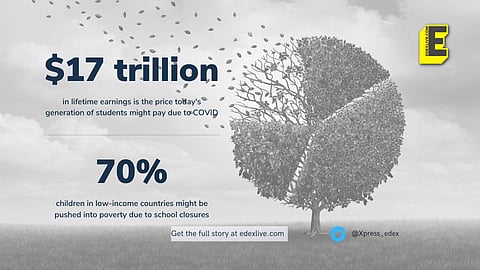

The present generation of students risks losing USD 17 trillion in lifetime earnings in present value, or about 14% of today's global GDP, as a result of COVID-19-related school closures, according to a new report prepared by the World Bank in collaboration with UNESCO and UNICEF. The report reveals that the impact is more severe than previously thought and far exceeds the USD 10 trillion estimate released in 2020.
The report, titled 'State of the Global Education Crisis: A Path to Recovery report', shows that in low- and middle-income countries, the share of children living in learning poverty — already 53% before the pandemic — could potentially reach 70%, given the long school closures and the ineffectiveness of remote learning to ensure full learning continuity during school closures.
"The COVID-19 crisis brought education systems across the world to a halt. Now, 21 months later, schools remain closed for millions of children and others may never return to school. The loss of learning that many children are experiencing is morally unacceptable. And the potential increase of learning poverty might have a devastating impact on future productivity, earnings and well-being for this generation of children and youth, their families and the world's economies," said Jaime Saavedra, World Bank's Global Director for Education.
The report pointed out that simulations estimating that school closures resulted in significant learning losses are now being corroborated by real data. "For example, regional evidence from Brazil, Pakistan, rural India, South Africa and Mexico, among others, show substantial losses in Math and reading. Analysis shows that in some countries, on average, learning losses are roughly proportional to the length of the closures. However, there was great heterogeneity across countries and by subject, students' socioeconomic status, gender and grade level," it said.
The report highlighted that, to date, less than 3% of governments' stimulus packages have been allocated to education and much more funding will be needed for immediate learning recovery. It also noted that while nearly every country in the world offered remote learning opportunities for students, the quality and reach of such initiatives differed — in most cases, they offered, at best, a rather partial substitute for in-person instruction.
"More than 200 million learners live in low- and lower-middle-income countries that are unprepared to deploy remote learning during emergency school closures. Reopening schools must remain a top and urgent priority globally to stem and reverse learning losses. Countries should put in place learning recovery programmes with the objective of assuring that students of this generation attain at least the same competencies as the previous generation," it said
"In terms of improving the efficiency of learning, techniques like targetted instruction can help learning recovery, which means that teachers align instruction to the learning level of students, rather than an assumed starting point or curricular expectation. Targetted instruction will require addressing the learning data crisis by assessing students' learning levels. It also necessitates additional support to teachers so that they are well-equipped to teach to the level of where children are, which is crucial to prevent losses from accumulating once children are back in school," it added.
